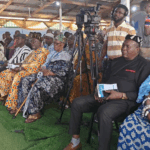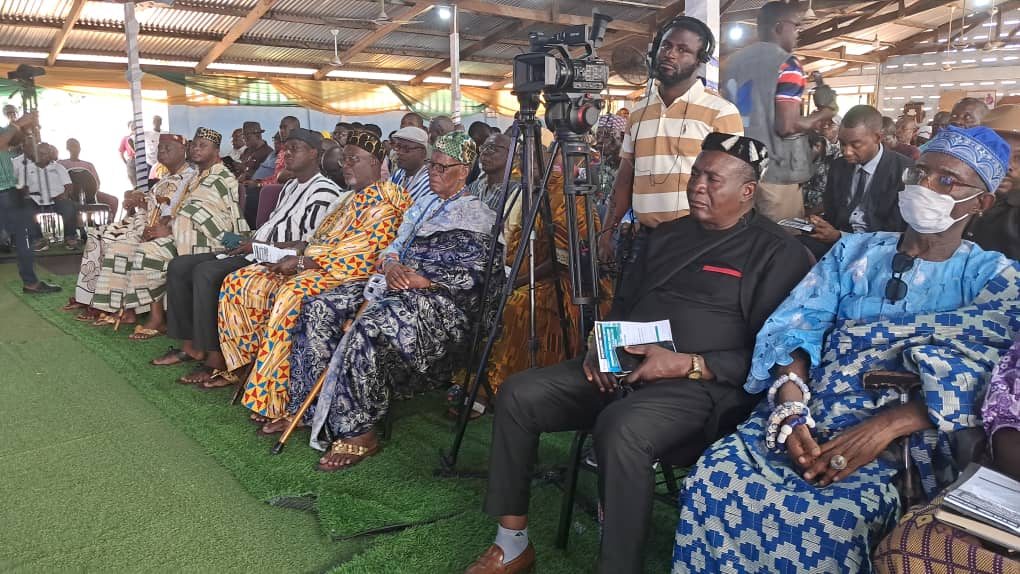
The Ghana Ports and Harbours Authority (GPHA) has once again reaffirmed its commitment to ensuring that the Keta Port Project is developed with the people at its heart, anchored on sustainability, inclusivity, and long-term socio-economic transformation for the Volta Region and Ghana at large.
Speaking on behalf of the Director-General of GPHA, Brigadier General Paul Seidu Tanye-Kulono (Rtd), the Director of the Port of Tema, Tebon Zumah, delivered a strong message of partnership and shared responsibility during a well-attended public hearing on the Keta Port Project held at the Global Evangelical Church, Bethel Chapel, Dzelukope.
The public hearing, convened in collaboration with the Environmental Protection Agency (EPA), formed part of the Environmental and Social Impact Assessment (ESIA) process aimed at engaging local communities and stakeholders in shaping the port’s development.
A Vision Beyond Infrastructure
Mr. Zumah described the proposed Keta Port as “one of Ghana’s most transformative infrastructural initiatives”—a project envisioned not merely as a maritime gateway but as “an anchor for sustainable economic growth, regional integration, and community development.”
He explained that the Keta Port forms part of Ghana’s broader maritime strategy to complement the existing ports of Tema and Takoradi, thereby expanding trade routes, stimulating industrialisation, and strengthening economic resilience.
“The port is designed to serve as Ghana’s third national gateway, strategically positioned to facilitate trade with our eastern corridor neighbours while creating new economic opportunities for the people of the Volta Region,” he said.
He emphasised that the Authority, under the guidance of the Ministry of Transport, has meticulously advanced planning, environmental, and socio-economic assessments to ensure the project aligns with international best practices and Ghana’s development priorities.
Commitment to Environmental Stewardship and Transparency
Highlighting GPHA’s commitment to responsible development, Mr. Zumah noted that the Authority places environmental and social considerations at the core of its project implementation.
“We recognise that large-scale infrastructure projects such as this come with significant environmental and social implications. This public hearing demonstrates our commitment to transparency and our readiness to listen, engage, and incorporate the views of all stakeholders,” he stated.
He explained that comprehensive Environmental and Social Impact Assessments (ESIAs) have been conducted, with findings to guide every stage of implementation—ensuring that the natural environment, coastal ecosystems, and livelihoods are safeguarded.
Driving Economic Growth and Local Empowerment
The Keta Port, according to GPHA, is projected to become a major logistics and industrial hub. Once completed, it will create thousands of direct and indirect jobs, attract private investment, and drive development in key sectors such as agriculture, fisheries, transportation, and manufacturing.
“Beyond commerce, the port will serve as a catalyst for regional development—improving roads, enhancing tourism, and positioning Keta as a key player in Ghana’s blue economy agenda,” Mr. Zumah added.
He noted that the Authority remains conscious of the need for equitable growth and inclusive participation, stressing that local communities would be central beneficiaries of the opportunities that the port will generate.
A Partnership for the People
Mr. Zumah reaffirmed GPHA’s pledge to partner with traditional authorities, local government institutions, youth and women’s groups, and civil society organisations to ensure the project delivers long-term benefits.
“This is your project as much as it is ours. Your voices matter in shaping its future. Sustainable development can only be achieved when the people whose lives are most affected are fully involved in the process,” he said.
He called on all stakeholders to see the port not only as a government project but as a shared vision of progress—one that will define the socio-economic landscape of the Volta Region for generations to come.
A Call to Collective Purpose
In his concluding remarks, Mr. Zumah urged participants to deliberate in a spirit of unity and collaboration, adding that the hearing was not merely a procedural requirement but a reflection of Ghana’s democratic and participatory development ethos.

“Let this public hearing not only be a regulatory requirement but also a demonstration of our collective resolve to build a modern port that reflects Ghana’s vision of progress—a port that will stand as a legacy for generations,” he concluded.
The event brought together traditional leaders from Keta, Anloga, and Ketu South municipalities, Members of Parliament, representatives of the EPA; and various community stakeholders, all of whom commended GPHA for its openness and commitment to inclusive development.
As the Keta Port Project continues to take shape, the message from the GPHA remains clear—development must go hand in hand with dialogue, inclusion, and sustainability.